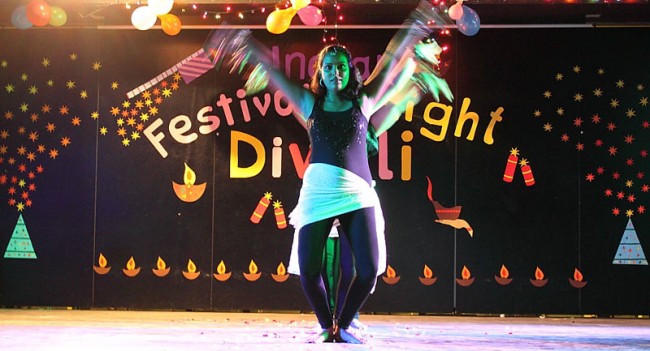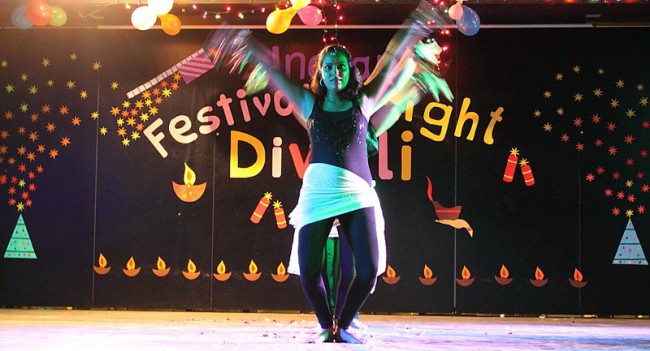BY SRIDHAR KARRA*
When I was a college student, I attended my university’s annual Diwali program, organized by a Hindu student organization on campus. In a university with a large number of Hindu students, turnout at this yearly event is substantial and attendance stretches far beyond the Hindu population. Students who are not Hindu or Indian enthusiastically attend in droves, with some professors in the Sociology department even urging their students to attend in order to understand and appreciate the Indian festival.
With this earnest curiosity and enthusiasm, my roommates and I made our way to our first Diwali program. The show included talented singers, traditional dancers, and hilarious emcees who engaged the crowd. But one act took this program from a diverse showcase of Hindu culture to the heights of cultural denigration and hypocrisy. The much-anticipated finale of the Diwali program was a performance by the university’s Bollywood fusion dance team. Comprised of male and female students, the team was an award winning, nationally known group. Their opening number was an energetic crowd-pleaser, “Ishq Kamina” from the film “Shakti”. The phrase “ishq kamina” translates to “love is a bitch.” The lyrics were supplemented by the dance team’s overtly sexual dance moves. The next song in the lineup went a step further. The team’s scantily clad girls grooved to “Kamli” from “Dhoom 3”, shimmying and grinding to lines like “you are all over my body every night.” The audience, keen to celebrate the “Festival of Lights,” loved the sparks they were seeing on stage.
Diwali marks the defeat of Ravana at the hands of Lord Rama, a king who vowed to rescue his beloved, kidnapped wife Sita. The holiday is typically celebrated by exchanging gifts, fireworks, and giving food to those in need. We give thanks for a wonderful year of health and wealth. But on this night, we celebrated Diwali by watching pelvic thrusts and singing along to “love is a bitch.” When I got back to my dorm room, I searched online for Diwali performances at other universities. I was disheartened to see a trend of cultural denigration. Bollywood fusion dance teams at universities around the country engaged in licentious displays at events associated with the religious holiday –year, after year, after year. Watching these performances reminded me of a scene from Mean Girls where Regina George and her plastic minions perform a raunchy version of “Jingle Bell Rock” at their school’s Christmas show. A Hollywood parody has now become a sad campus reality. The golden significance of Diwali has been reduced to a plastic display of impropriety.
I have nothing against university Bollywood fusion dance teams. In fact, I have the utmost respect for them. Students on these teams undergo a competitive audition process, painstakingly master complex choreography, and dedicate countless hours to practicing as a team to perform at competitions and university events. Their dedication to their craft results in lasting friendships, school pride, and an elevation of this unique art form. Performing to “Ishq Kamina” and “Kamli” is fair game at a competition or program not associated with a religious festival. But diluting the significance of a holy festival to a sultry exhibition is simply unacceptable.
The cultural affronts by brown college students are not confined to Diwali programs. During Navaratri, various cultural organizations host Garba dances. Garba is a form of dance that originated in the Indian state of Gujarat, and has deep religious significance. With hundreds of people performing intricate dances around the idol of a chosen deity, this joyful celebration glorifies the powerful form of the Divine. Due to their unique appeal, Garba dances are attended by a wide variety of participants, regardless of ethnicity or religious affiliation. The first time I attended a Garba as a college student, I agreed to meet with a group of Indian friends at the venue and enter with them. To my dismay, as I approached the group, I found that they reeked of alcohol. They had consumed copious amounts of booze before the event in an attempt to make Garba “more fun.” By the time they had begun dancing, they were stumbling on the dance floor, overcome with inebriation. Garba symbolizes the divine interplay between the purusha (human) and paramatma (the Almighty). For many, it is a form of worship. It is not a frat party. We would find it unimaginable for someone to show up drunk to a church, mosque, or temple. Then how can we justify showing up drunk to Garba?
The brown community has a bone to pick with cultural appropriation and mockery. We were outraged when Heidi Klum dressed as Goddess Kali at a Halloween party, complete with multiple arms and blue skin. Selena Gomez’s use of a bindi as a fashion statement left us fuming. Fan-made artwork depicting rapper Iggy Azalea as a Hindu goddess had us up in arms (no pun intended). Nearly every time a public figure is in the news for arrogation of Hindu culture, I find my Hindu-American friends in a rage. They flood social media with passionate railings against the offending celebrity and lament the degradation of their beloved culture. But are we responsibly representing our own culture when we not only tolerate, but sanction lewd celebrations at our religious festivals? Are we respecting our own culture when we transform a joyous form of worship into drunken revelry?
As I was heading back to my dorm after the Diwali program, my non-Hindu, non-Indian friend asked, “So Diwali is a pretty sexy holiday, huh?” I was speechless. If watching the dance team’s performance was a slap to the face, then my friend’s question was a punch right to my gut. At that moment, I realized that the way we publicly celebrate our festivals directly correlates to how others perceive our religion. We are so quick to don the role of cultural custodians and defend our faith when “others” disrespect it, but give ourselves a free pass when it comes to observing our own customs. Why should we expect them to respect our religion when we have no respect for it in the first place? The blame for cultural denigration does not only lie with those brown college students who misrepresent their religion; it also lies with those who silently witness the corruption of their religion.
The logical first step to rectify the problem would be to curtail our behavior and represent the religion the way it was meant to be. But if challenging the status quo is far too cumbersome, the alternative is to continue the same outward displays, but remove religion from the equation. Instead of a “University Diwali Program”, call it a “Sexy Fall Dance Program.” We might as well remove the deity in the middle of the Garba dance floor and call the event “Drunkenly Dancing In a Circle in Indian Clothing.”
Let’s think twice the next time we feel like castigating others for trampling on our culture — especially when we do such a good job of it ourselves.
*Sridhar Karra is an Economics graduate and a lifelong Texan. He works in software and was a speaker at a TEDx conference. He bleeds blue and silver for his beloved Dallas Mavericks and Dallas Cowboys.






